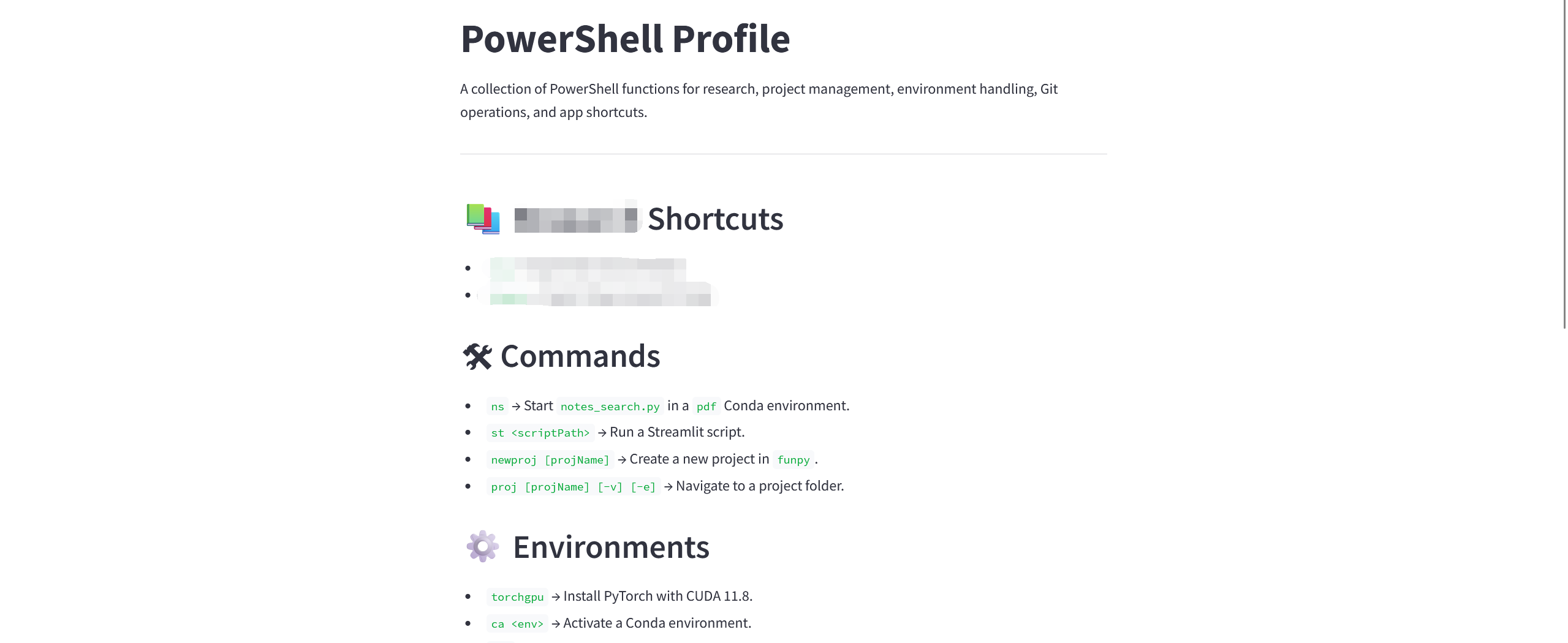SanBingYouYong

UoE BSc Computer Science First-class Honours --> Imperial MSc Advanced Comput'ing
Windows Terminal bashrc-like Customization
-
Use
echo $PROFILEto check whichprofile.ps1file your Windows Terminal is using.
- Allow locally written scripts by searching for the keyword: remote signed.
- Use
. $PROFILEto apply your changes likesource ~/.bashrc, or restart the terminal. - Define constants (
export xxx=xxxxxx):Set-Variable -Name “xxx” -Value “xxxxxxx” -Option Constant- You can then use them with
$xxx. - Or directly use
$xxx = xxxxxx.
- You can then use them with
- Define functions (
alias f="xxxx"):function f { xxxx }- LLMs probably do this better than you.
- For example:
- Quickly open your magical tools library:
function proj { param ( [string]$projName, [switch]$vscode, [switch]$explorer ) if ($projName) { $projPath = Join-Path -Path $funpy -ChildPath $projName if (Test-Path $projPath) { Set-Location $projPath if ($explorer) { explorer.exe . } if ($vscode -or -not $explorer) { code . } } else { Write-Error "The project '$projName' does not exist." } } else { Get-ChildItem -Path $funpy -Directory | ForEach-Object { $_.Name } } }
- Quickly open your magical tools library:
- Nice, but what if I forgor?
-
https://stackoverflow.com/questions/15694338/how-to-get-a-list-of-custom-powershell-functions:
# get custom functions $sysfunctions = Get-ChildItem function: function custom {Get-ChildItem function: | Where-Object {$sysfunctions -notcontains $_} }
-
- If you would like to be more elegante~
- Write or have a big model help generate a
profile.ps1document, such asreadme.md. - Install streamlit in your local Python environment.
-
Write the following simple streamlit webpage to read and display the markdown.
import streamlit as st import os import subprocess # Set the page configuration to use the wide layout st.set_page_config(layout="centered") # Retrieve the profilePath variable from PowerShell # Make sure you have defined the profilePath variable in your environment or profile.ps1, which is the folder where your $PROFILE resides. profile_path = subprocess.check_output(['powershell', '-Command', '(Get-Variable -Name profilePath).Value'], text=True).strip() doc_path = os.path.join(profile_path, 'readme.md') with open(doc_path, 'r', encoding='utf-8') as file: readme_content = file.read() st.markdown(readme_content) -
Also, define a simple function to replace manual commands.
function doc { $doc_py_path = Join-Path -Path $profilePath -ChildPath "doc.py" streamlit run $doc_py_path }
- Write or have a big model help generate a
- Now, you can simply type
docin the command line to get:
